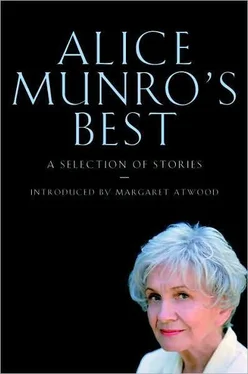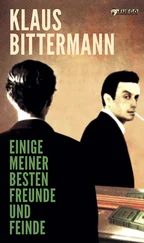All this was what I wondered at the time. Later, when I knew more, at least about sex, I decided that Brian was Herb’s lover, and that Gladys really was trying to get attention from Herb, and that that was why Brian had humiliated her — with or without Herb’s connivance and consent. Isn’t it true that people like Herb — dignified, secretive, honorable people — will often choose somebody like Brian, will waste their helpless love on some vicious, silly person who is not even evil, or a monster, but just some importunate nuisance? I decided that Herb, with all his gentleness and carefulness, was avenging himself on us all — not just on Gladys but on us all — with Brian, and that what he was feeling when I studied his face must have been a savage and gleeful scorn. But embarrassment as well — embarrassment for Brian and for himself and for Gladys, and to some degree for all of us. Shame for all of us — that is what I thought then.
Later still, I backed off from this explanation. I got to a stage of backing off from the things I couldn’t really know. It’s enough for me now just to think of Herb’s face with that peculiar, stricken look; to think of Brian monkeying in the shade of Herb’s dignity; to think of my own mystified concentration on Herb, my need to catch him out, if I could ever get the chance, and then move in and stay close to him. How attractive, how delectable, the prospect of intimacy is, with the very person who will never grant it. I can still feel the pull of a man like that, of his promising and refusing. I would still like to know things. Never mind facts. Never mind theories, either.
When I finished my drink I wanted to say something to Herb. I stood beside him and waited for a moment when he was not listening to or talking with anyone else and when the increasingly rowdy conversation of the others would cover what I had to say.
“I’m sorry your friend had to go away.”
“That’s all right.”
Herb spoke kindly and with amusement, and so shut me off from any further right to look at or speak about his life. He knew what I was up to. He must have known it before, with lots of women. He knew how to deal with it.
Lily had a little more whisky in her mug and told how she and her best girlfriend (dead now, of liver trouble) had dressed up as men one time and gone into the men’s side of the beer parlor, the side where it said MEN ONLY, because they wanted to see what it was like. They sat in a corner drinking beer and keeping their eyes and ears open, and nobody looked twice or thought a thing about them, but soon a problem arose.
“Where were we going to go? If we went around to the other side and anybody seen us going into the ladies,’ they would scream bloody murder. And if we went into the men’s somebody’d be sure to notice we didn’t do it the right way. Meanwhile the beer was going through us like a bugger!”
“What you don’t do when you’re young!” Marjorie said.
Several people gave me and Morgy advice. They told us to enjoy ourselves while we could. They told us to stay out of trouble. They said they had all been young once. Herb said we were a good crew and had done a good job but he didn’t want to get in bad with any of the women’s husbands by keeping them there too late. Marjorie and Lily expressed indifference to their husbands, but Irene announced that she loved hers and that it was not true that he had been dragged back from Detroit to marry her, no matter what people said. Henry said it was a good life if you didn’t weaken. Morgan said he wished us all the most sincere Merry Christmas.
When we came out of the Turkey Barn it was snowing. Lily said it was like a Christmas card, and so it was, with the snow whirling around the streetlights in town and around the colored lights people had put up outside their doorways. Morgan was giving Henry and Irene a ride home in the truck, acknowledging age and pregnancy and Christmas. Morgy took a shortcut through the field, and Herb walked off by himself, head down and hands in his pockets, rolling slightly, as if he were on the deck of a lake boat. Marjorie and Lily linked arms with me as if we were old comrades.
“Let’s sing,” Lily said. “What’ll we sing?”
“‘We Three Kings’?” said Marjorie. “‘We Three Turkey Gutters’?”
“‘I’m Dreaming of a White Christmas.’”
“Why dream? You got it!”
So we sang.
I FOUND MY FATHER in the heart wing, on the eighth floor of Toronto General Hospital. He was in a semi-private room. The other bed was empty. He said that his hospital insurance covered only a bed in the ward, and he was worried that he might be charged extra.
“I never asked for a semi-private,” he said.
I said the wards were probably full.
“No. I saw some empty beds when they were wheeling me by.”
“Then it was because you had to be hooked up to that thing,” I said. “Don’t worry. If they’re going to charge you extra, they tell you about it.”
“That’s likely it,” he said. “They wouldn’t want those doohickeys set up in the wards. I guess I’m covered for that kind of thing.”
I said I was sure he was.
He had wires taped to his chest. A small screen hung over his head. On the screen a bright jagged line was continually being written. The writing was accompanied by a nervous electronic beeping. The behavior of his heart was on display. I tried to ignore it. It seemed to me that paying such close attention — in fact, dramatizing what ought to be a most secret activity — was asking for trouble. Anything exposed that way was apt to flare up and go crazy.
My father did not seem to mind. He said they had him on tranquillizers. You know, he said, the happy pills. He did seem calm and optimistic.
It had been a different story the night before. When I brought him into the hospital, to the emergency room, he had been pale and close-mouthed. He had opened the car door and stood up and said quietly, “Maybe you better get me one of those wheelchairs.” He used the voice he always used in a crisis. Once, our chimney caught on fire; it was on a Sunday afternoon and I was in the dining room pinning together a dress I was making. He came in and said in that same matter-of-fact, warning voice, “Janet. Do you know where there’s some baking powder?” He wanted it to throw on the fire. Afterwards he said, “I guess it was your fault — sewing on Sunday.”
I had to wait for over an hour in the emergency waiting room. They summoned a heart specialist who was in the hospital, a young man. He called me out into the hall and explained to me that one of the valves of my father’s heart had deteriorated so badly that there ought to be an immediate operation.
I asked him what would happen otherwise.
“He’d have to stay in bed,” the doctor said.
“How long?”
“Maybe three months.”
“I meant, how long would he live?”
“That’s what I meant too,” the doctor said.
I went to see my father. He was sitting up in bed in a curtained-off corner. “It’s bad, isn’t it?” he said. “Did he tell you about the valve?”
“It’s not as bad as it could be,” I said. Then I repeated, even exaggerated, anything hopeful the doctor had said. “You’re not in any immediate danger. Your physical condition is good, otherwise.”
“Otherwise,” said my father gloomily.
I was tired from the drive — all the way up to Dalgleish, to get him, and back to Toronto since noon — and worried about getting the rented car back on time, and irritated by an article I had been reading in a magazine in the waiting room. It was about another writer, a woman younger, better-looking, probably more talented than I am. I had been in England for two months and so I had not seen this article before, but it crossed my mind while I was reading that my father would have. I could hear him saying, Well, I didn’t see anything about you in Maclean’s. And if he had read something about me he would say, Well, I didn’t think too much of that write-up. His tone would be humorous and indulgent but would produce in me a familiar dreariness of spirit. The message I got from him was simple: Fame must be striven for, then apologized for. Getting or not getting it, you will be to blame.
Читать дальше












